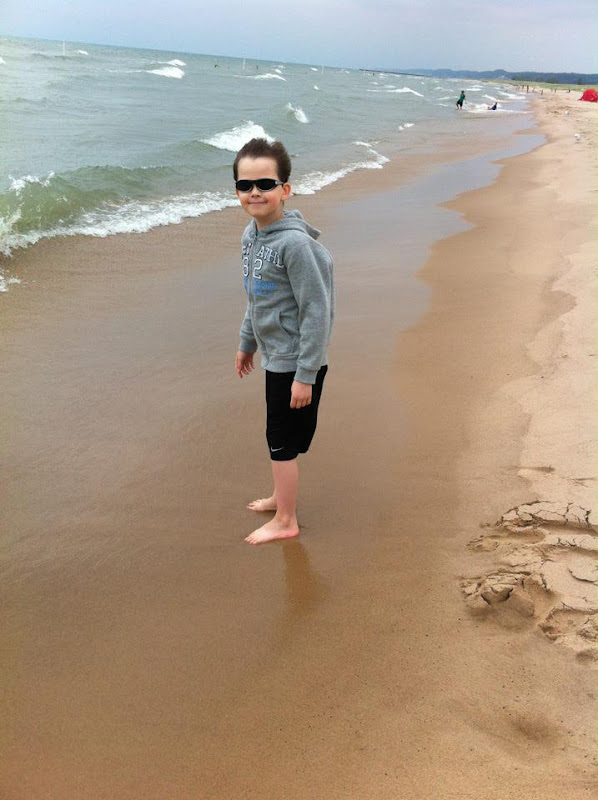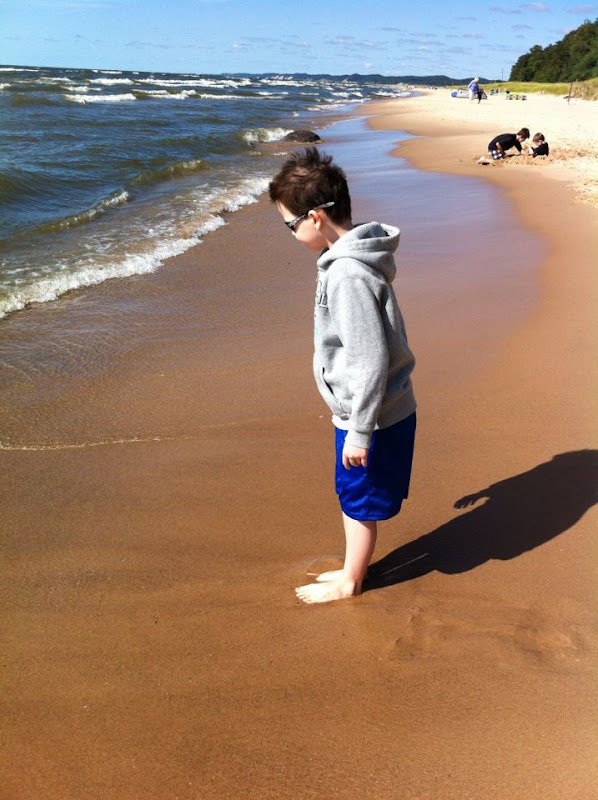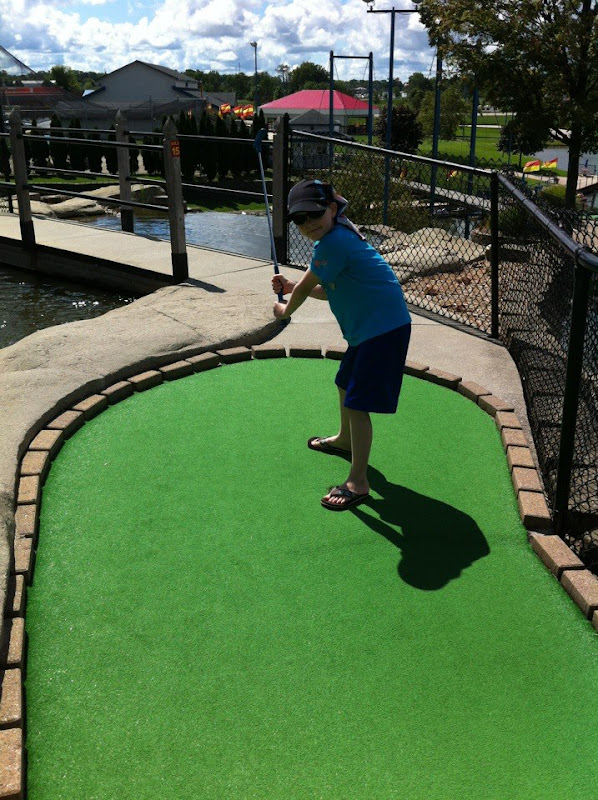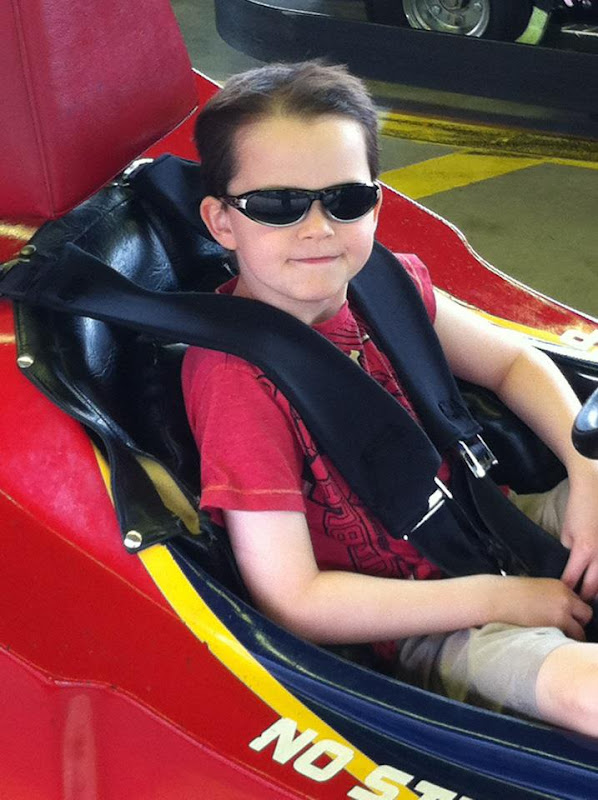I started off writing the previous update fully intending to tell you what's been going on with Adam these past few weeks! I'm not entirely sure what happened along the way, but the only relevant information I imparted was that he and Alison got a taxi to the airport at 7am on the morning of August 6th.
Before I get started into this enormous update I'll get the most important part out of the way first. Adam is doing ok. He's been well in himself, pain-free, eating ok (albeit it's nowhere near as easy for Alison to manage his eating as it is when he's at home), sleeping well. For a child who (as we now know) first experienced disease progression sometime between November of last year and January of this, and whose disease has continued to progress since, he looks a veritable picture of health. And for that, at least, we continue to be thankful. And so on we go ...
Adam's blood work had been pretty rubbish during the preceding two weeks; though we didn't know if this was down to the chemo (a combination he'd never had before), the amount of bone marrow disease he has, or (as we ended up surmising) a combination of both. When I first talked with Dr Sholler I had thought briefly about Adam going out there a week sooner than he eventually did. Partly, due to a natural urge to be on-treatment as much as possible, and off-treatment as little as possible. It was just as well I ended up accepting the doc's better judgement, for with hindsight he would never have been ready to start in Grand Rapids any earlier. Plus it fitted very nicely with the whole Olympics thing I told you about last time.
There were a couple of options of how to get to Grand Rapids, Michigan; take an international flight and then a connecting flight to Grand Rapids or Lansing, or hire a car to drive from the nearest international airport. That would have been Detroit, but in the end we booked a Virgin Airlines flight to Chicago and Alison drove back round Lake Michigan. The flight was good - Adam kept himself reasonably occupied which enabled Alison to get a little bit of sleep. It was early evening by the time they arrived at the end of a long journey; the drive had been an eighty minute crawl out of Chicago, and then a two-hour breeze around Lake Michigan and across into Grand Rapids. I think Alison was having difficulty keeping track of the time; Chicago being 6-hours behind but Grand Rapids being only 5, the other hour having disappeared somewhere on the drive back eastwards.
The plan, although not set in stone, had been full disease re-evaluation during week one, treatment during week two, then fly home on the weekend of 18th/19th August before side-effects started to kick in and render Adam unfit to fly. The schedule which we'd received in advance, was for bone marrow biopsies on Tuesday morning, MIBG injection Tuesday afternoon, MIBG/SPECT scan Wednesday morning, and PET/CT scan Thursday morning; so you could say they hit the ground running. A clinic meeting with Dr Sholler was also scheduled for Thursday afternoon to discuss results, and decide on a treatment strategy.
The hospital is Helen De Vos Children's Hospital, Grand Rapids. The research institute out of which Dr Sholler's lab operates is the Van Andel Institute (VAI), and the consortium of hospitals that offers clinical trials based upon this research collectively forms the NMTRC. Helen De Vos Children's Hospital is a member of the NMTRC. You follow?
Bone marrow was fairly unpleasant as per usual, and Adam was a bit sore afterwards. They gave him Propofol as an anaesthetic and as we've seen countless times at the Marsden Adam came round deeply disturbed, distressed and angry. As we had planned, Alison paid for samples of bone marrow to be shipped to CHOP for ALK and PHOX2B testing, the results of which won't be known for several weeks yet. Generally the timings of scans were very good, first thing in the morning which made fasting times more easily manageable. The restricted diet requirement for 24 hours prior to PET/CT was probably the most challenging for Alison. Particularly given Adam's body clock must have been all over the place during that first week.
I asked Alison what her initial impressions were of Dr Sholler. "She's lovely" was the response I got; the fact she was there to meet Alison and Adam on the Tuesday morning when they first went into the hospital helped to establish a relationship. It may not seem like very much, but when you've travelled nearly 4,000 miles to a foreign country with your sick child, and you find yourself in a place where you know nothing and nobody, and you're a little scared, and your apprehensive about what's coming down the line … small things can make a big difference.
Accommodation had been arranged in advance at the Renucci Hospitality House. To say it's close to the hospital would be an understatement. Adam gave me a tour using FaceTime on the iPad. Out of one door you leave the hospitality house, down an internal corridor, and 30 seconds later through a second door you are into the hospital itself. Certainly no using traffic congestion as an excuse for not being on time for appointments here!
One of the things we had wondered about was the MIBG scan. Despite sending six months going back-and-forth to Greifswald Adam had only ever had MIBG scans in the UK before, at the Royal Marsden and UCLH. As you can imagine he is very used to having MIBG scans by now, but he's also very used to having a routine. And MIBG scans involve watching a portable DVD player, except for the scanning segment from the neck upwards, during which it's audio-only for Adam.
We needn't have been concerned. Helen De Vos have Vuzix video eyewear that provides "a virtual 67-inch screen as seen from 10 feet". Now that, ladies and gentlemen, is some pretty cool stuff. Well it is if you're a gadget freak like me. Adam certainly thought so, at the end of the scan he asked the technician if he could take a pair home with him. Now I'm a firm believer in the adage "if you don't ask, you don't get", but that really is taking things to extremes! Needless to say on this occasion he came out empty handed. The other major plus over the Royal Marsden is the scanning equipment (procedure?) itself; the table slides slowly and continuously through the imaging mechanism, whereas back home there's a manual realignment before each discrete section is scanned. In absolute terms the delay isn't significant, but that's not how it's perceived when you're in there just waiting for it to be over with.
On Thursday afternoon, after a not inconsiderable wait in clinic, and then a false start as Dr Sholler got paged out to the ICU, Alison received results of the scans. It's the first time she's ever had results before without me being present, so I can tell you she would have been the most nervous and apprehensive she's ever been in her life. Our consultant at the Marsden is very good these days; if we have scans on Weds and Thurs we'll get the results (either by phone or at a clinic appointment) by the end of the same week. I hear some horror stories from other places though, parents being kept waiting days or even weeks … which as far as I'm concerned is cruel, unnecessary and quite indefensible
The results were ok-ish. Not terrible, but not great either, but then they were never going to be having done just a single round of Cytoxan and Topotecan after the further progression we'd seen between end of April and end of June whilst on Temozolomide and Irinotecan. But Alison was alright. Again small things make big differences. Dr Sholler's opening of "right we have some options to discuss" set the tone for the meeting I think. Sure the details of the scan results were discussed, but it was with a positive purpose rather than to be dwelt upon with an inevitable hopelessness. I can't compare Dr Sholler to our own consultant, but what I will say is that considering Alison had never been in this position before, considering she was so massively outside her comfort zone, and considering she had never even spoken to Dr Sholler before going out to Grand Rapids, the whole thing went pretty well. Having got an outline of the results, and an outline of the options, we arranged a video conference for the next day so that I could participate in the discussion, and subsequent decision making.
Now comes the part where I get all excited about technology again. Or rather Dr Sholler's use of it. The Royal Marsden hadn't sent a copy of Adam's most recent scans to Helen De Vos. I'd previously FedEx'd a CD with all scans up to and including end of April, but they hadn't got a copy of MIBG and MRI from the end of June. Whilst I'm not normally slow in pointing an accusatory finger, and I wasn't very happy at the time, I do think on reflection that this was more oversight than incompetence. The first thing I'd done after getting those scan results was to get the Marsden to burn me two copies so I could have them at home in order to forward them on to whomever, as and when required. So I think they probably thought I'd already sent them to Dr Sholler when the request for them went in. Unfortunately I hadn't. Moreover I hadn't know nothing had been sent … otherwise I could quite easily have slipped a CD into Adam's suitcase and he could have taken it over himself! As it was the most important scans for comparison purposes were in my house and in my possession, rather than in the hospital in Grand Rapids and in Dr Sholler's possession. So, in the middle of our video conference on Friday, Dr Sholler asked one of the IT team to setup a WebEx meeting between the two of us, made me the presenter of it, and got me to share my PC screen with her. In that way she was able to review Adam's latest scans from the Royal Marsden whilst the actual disc with the images on was sat inside my computer on top of my dining room table. And if you're not impressed with that people, well you really ought to be!
Adam's MIBG scan was about the same. As were the bone marrow results. His PET/CT, however, actually showed more disease than MIBG, although this in itself didn't mean too much as we had no prior PET to compare with. I had wanted to do one back in April but the scanner broke and couldn't be fixed in time, they're not allowed to scan children at the Royal Marsden in Chelsea, and having just found out the extent of Adam's bone marrow disease we felt we couldn't afford to delay starting treatment. Of more significance was the diseased lymph nodes; they first showed up on MRI in Germany in January, had remained unchanged until April when they appeared bigger, and had shrunk considerably after two rounds of temozolomide and irinotecan. These now appeared larger on PET/CT than the previous MRI - an indication that the previous round of chemo had not worked so well.
Whilst progression can never be good news, in this case it did bring the genomic-based personalised medicine trial back into play. Dr Sholler had received an initial indication from the relevant people that a needle biopsy would be feasible, although far from straight forward. Essentially it was our call. Alison and I talked it through, but I think we had both already reached the same conclusion. This was potentially the opportunity to find out as much as possible about Adam's disease, and use that information to give us some treatment options specifically targeted to it. For me the clincher was the fact we'd now had samples taken from both of Adam's areas of disease; lymph nodes and bone marrow. We'd done one chemo combination and the bone/bone marrow disease had shown progression on MIBG, but the lymph nodes had shrunk on MRI. Then we'd switched to a different chemo and we'd got stable bone/bone marrow disease and the lymph nodes had grown. Maybe they needed to be treated separately? Or maybe they needed something more targeted, and different from anything Adam had received before. Either way this was an opportunity to perhaps answer some of the questions we had, that it seems like we've always had. Another factor was Adam's recovery from chemo, which is getting slower and slower each time. We needed a change of direction. One of the potential pitfalls of personalised medicine is that a disease like neuroblastoma can mutate, and if you treat a biopsied tumour successfully you might have another area of disease elsewhere that continues to develop because it isn't precisely the same. With samples from both bone marrow and lymph nodes hopefully we could overcome this problem - if indeed it really is a problem. This is very much experimental, very much at the forefront of current research, so at present nobody really knows the answers.
Whilst doing the biopsy and enrolling on the personalised medicine trial absolutely felt like the right thing to do, it was nonetheless a difficult thing to commit to. You know you are going to be putting your child through something very unpleasant at best, and very dangerous at worst. This was a long-needle biopsy going in at the back, and down past the kidney, to access the required lymph nodes. It would also completely alter the duration of the stay in Grand Rapids. The biopsy could be carried out on the Tuesday (14/08) and treatment would then begin on Tuesday or Wednesday of the following week. Which meant another week off treatment. Instead of the normal 3 or 4 weeks, it would be a full 6 weeks since Adam had started his previous course of treatment. And the original plan was for Alison and Adam to fly home on the 19th, whereas now it would be more than a week later at least. Nonetheless it was the right thing to do, all the other stuff we'd just have to deal with.
The biopsy was scheduled for Tuesday afternoon, and Adam wasn't allowed to eat during the day. After his experiences with Propofol this time they used Ketamine, our hallucinogenic friend from Greifswald, to put him to sleep. The procedure took an hour, and they successfully obtained tissue samples for analysis. The worst part turned out to be afterwards. Because of the delicate nature of the procedure, and the possibility that they'd damaged something on the way through to the lymph nodes Adam was not permitted to eat or drink for a further three hours once he'd come round from the anaesthesia. This was in case they needed to take him back into theatre for emergency reparatory surgery. As you might imagine Adam was very thirsty, and very hungry, and all Alison could do was try to placate him until the clock eventually ticked round to 18:30. Thankfully he was fine, no damage done, and he was duly discharged back to Renucci House.
Because Renucci is designed to accommodate relatives of in-patients, and Adam now no longer was, the house initially wanted Alison and Adam out by 11am the next morning; which was unfortunate given how rough, achy, and generally miserable Adam was feeling when he woke up. Thankfully a helpful intervention was forthcoming, and they were allowed to stay for one further night, which not only made planning what to do next easier but more importantly gave Alison some peace of mind that if Adam were to become unwell there was no better place for it to happen. In the end he had a very lazy day recovering, but there was no drama.
The personalised medicine trial involves a complete genomic profile of the tumour sample, and subsequent cross-matching against a database of some 200 or so drugs; including chemotherapies, inhibitors, novel agents, and natural compounds. The idea is to perform all this systematic analysis and produce a report that identifies those candidates that score most highly, in the hope that these will prove to be the most effective treatment options for the specific strain of disease. Once the report is produced it is discussed amongst oncologists, biologists, pharmacists etc. from all the participating medical institutions (17 or so in total I think), and they decide on the actual, individual, treatment plan i.e. which drug combination to use, in what doses, and on what schedule. Often, as turned out to be the case with Adam, the highest scoring candidates may come from the same family of drugs designed to do broadly the same thing, so it wouldn't necessarily make sense to use more than one of them. Instead a second agent that may have scored slightly lower, but with a different mechanism of action, would be a more appropriate choice. This trial may be scientific, and very computationally expensive (Dell donated $4M to the provide the compute power to massively speed up the processing time), but at the end of the day it is still the doctors that make the most important decisions of all, albeit hopefully with the most detailed and accurate information possible. For those who are interested, I found this to be a very good article explaining the trial First Genomic-based Pediatric Trials Launched in Neuroblastoma.
Even with all the computing power that Dell has provided, it still takes a week to produce an initial report and put together a treatment plan. Because some analysis takes considerably longer still, the process continues after treatment has started, and the plan may change as more results are received and taken into consideration. What this meant in practical terms for us was that Alison and Adam unexpectedly had a week off to do whatever they wanted … or rather whatever Adam wanted ...
The beach. The beach again. Go-karting. Go-karting again. Mini-golf. Amusement arcade. Amusement arcade again. Swimming pool. Shopping (Games, Toys, and Build-A-Bear). Museum. Zoo. Not necessarily in that order. A few days spent on Lake Michigan, a few days relaxing back in Grand Rapids.
Back at the hospital on Tuesday Alison received the preliminary results of the biopsy analysis, and an initial treatment plan. The tumour tissue was consistent with Adam's original diagnosis (lymph node biopsy in July 2009) and tumour resection (in Aug 2010); a mixture of ganglioneuroma and neuroblastoma indicating a more mature type of disease. The treatment plan we have is combination of two drugs, neither of which Adam has received before, and both of which are more commonly found in the treatment of leukaemia, in particular acute myeloid leukaemia (AML). The first, sorafenib, is an oral drug that is of a class of agents known as multi-kinase inhibitors. These drugs work by trying to interrupt and block the pathways through which cancer cells survive and divide. The second, cytarabine, is a chemotherapy drug that is given either as an intravenous push through a central access line, or as a subcutaneous injection beneath the skin. The dose of the cytarabine in Adam's treatment plan is lower than that traditionally used in leukaemia patients. There are potential side-effects with both, many and varied, but the doctor is hopeful the combination could be well-tolerated by Adam and afford him a good quality of life without too many problems. If it does so, whilst at the same time getting his disease under control, then we'll have hit the jackpot.
I've read many a bullshit comment, clearly written by people who know absolutely nothing at all about it, regarding the self-serving motivations of parents who take their children abroad for treatment. Well that's our motivation, and our goal, right there. Good quality of life and disease back under control. Not one or the other. Both. It's not a choice, it's not negotiable, we wouldn't make Adam's life a complete and utter misery just so we could pat ourselves on the back and say we did everything we could. Neuroblastoma treatment in the UK is a mess for a number of reasons, and frankly something has to change. People are being urged to start fundraising when their child is diagnosed just in case they need to go abroad … and yet I'm sure some of them don't have the first clue what's involved, or where they'd go, or what they'd do. But what they do know is the incontrovertible truth that there are more options abroad, many more options. And they're scared. And raising money gives them a positive purpose. But how much better would it be if that money could be used to collectively provide more treatment options over here? Not just more research - Cancer Research UK fund research (well a little of it they do anyway where paediatric cancer is concerned). I am talking about making clinical trials from other countries and other institutions available in the UK, making them more accessible to more of our children. Then we can stop having to listen to that other bullshit statement that continuously winds me up; that UK parents have to raise hundreds of thousands of pounds to take their children abroad for life-saving treatment. Except for a small and specific minority of cases where that statement may well be true, it's complete bunkum. There are no absolutes, just more options, and in some cases if you get lucky, and navigate successfully, much better options. Anyway, rant over; I'll step down off my soapbox. I actually wrote a paper on this stuff a few months back ("Why?" you might ask, with some justification. I'm not really sure, I just did). It's published here on the Adam's Appeal website for anyone who's interested - just don't rush all at once and crash my web server.
Having already put back return flights to the UK from 19th August to 29th August, this new treatment schedule of Adam's means yet another change of plan. Not surprisingly FDA approval of the personalised medicine trial comes with certain stipulations. One being that the first cycle must be carried out at the treating NMTRC institution. If we find a combination that is well-tolerated, efficacious, and that the Marsden are prepared to oversee we will subsequently be able to treat Adam back in the UK. However, for the first round, and PET/CT scan that follows he has to be remain in Grand Rapids. And each cycle is 28 days in duration. He has oral sorafenib twice daily for the entire period, and i.v. (or s.c.) cytarabine for the first 4 days, has a 3 days break, then for 4 more days. So the schedule is both drugs on days 1-4 and 8-11, and sorafenib only on days 12-28. All of which means Adam now has to stay in Grand Rapids (or thereabouts) for another few weeks. Today (Friday 24/08) is day 4 on the schedule. From 01/09 he'll be on oral sorafenib alone and will need only attend hospital once a week for blood draws and a clinical examination. Sometime during w/c 17th September he'll have a repeat PET scan, and if all looks satisfactory will be allowed to return home to complete the next two cycles back in the UK before heading out again for another re-scan. I don't know what happens if the treatment needs to change; right now I don't want to know either. A 28-day course of sorafenib cost justs under six thousand dollars, and it's very unlikely we'll be able to get it on the NHS - although that may not stop me applying to the Cancer Drugs Fund. Cytarabine is more of a possibility, but we've only just started discussions with the Marsden to find out precisely what's involved. I have no idea how much the scans, consultations, etc. have been costing; the NB Alliance have been taking care of that side of things. And for that, and for all the money raised in Adam's Appeal we are truly, truly, thankful.
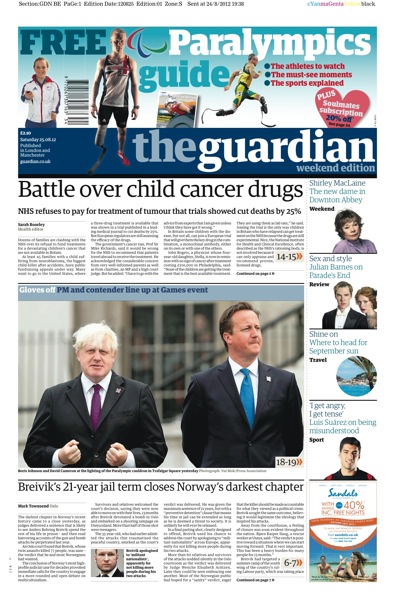 Here are the two articles online; Families raising funds to treat children for cancer abroad and How children's cancer is making parents 'stab in the dark' for treatment.
Here are the two articles online; Families raising funds to treat children for cancer abroad and How children's cancer is making parents 'stab in the dark' for treatment.

